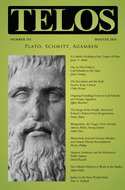Ulrike Kistner’s “The Exception and the Rule: Fictive, Real, Critical” appears in Telos 157 (Winter 2011). Read the full version online at the TELOS Online website, or purchase a print copy of the issue here.
 Walter Benjamin’s famous statement, in the eighth of his “Theses on the Philosophy of History” (1940), that “the state of exception in which we live is not the exception but the rule,” has become as normalized as its proposition asserts. Yet it has given rise to different and contrasting understandings variously bounced around between Carl Schmitt, Benjamin, and Giorgio Agamben. Benjamin’s thesis could be read in correlation with Schmitt’s invocation of the state of exception to protect the Weimar Constitution from its own fragility. However, this would not explain the adjective “real” in “a real state of exception” of the task posed by the thesis. The term clearly points in the direction of the distinction between “fictive” and “real” states of exception, which in turn brings into focus the distinction and relation between sovereign and commissarial dictatorship, as outlined by Schmitt in his history of the concept of sovereignty. It is within the paradox of an impossible form of sovereign dictatorship that Schmitt indicates the possibility of constituent power in constitutional democracies. This idea can be connected with the ruptural power of divine violence of Benjamin’s “Critique of Violence” (1921). While Agamben recognizes some of the lines of derivation of “state of siege” and “state of exception,” he does not realize the critical force of Schmitt’s paradox of sovereign dictatorship or Benjamin’s notion of pure violence. This blind spot is consequential: it eclipses the possibility of critique, along with the imagination figuring possibilities of the new.
Walter Benjamin’s famous statement, in the eighth of his “Theses on the Philosophy of History” (1940), that “the state of exception in which we live is not the exception but the rule,” has become as normalized as its proposition asserts. Yet it has given rise to different and contrasting understandings variously bounced around between Carl Schmitt, Benjamin, and Giorgio Agamben. Benjamin’s thesis could be read in correlation with Schmitt’s invocation of the state of exception to protect the Weimar Constitution from its own fragility. However, this would not explain the adjective “real” in “a real state of exception” of the task posed by the thesis. The term clearly points in the direction of the distinction between “fictive” and “real” states of exception, which in turn brings into focus the distinction and relation between sovereign and commissarial dictatorship, as outlined by Schmitt in his history of the concept of sovereignty. It is within the paradox of an impossible form of sovereign dictatorship that Schmitt indicates the possibility of constituent power in constitutional democracies. This idea can be connected with the ruptural power of divine violence of Benjamin’s “Critique of Violence” (1921). While Agamben recognizes some of the lines of derivation of “state of siege” and “state of exception,” he does not realize the critical force of Schmitt’s paradox of sovereign dictatorship or Benjamin’s notion of pure violence. This blind spot is consequential: it eclipses the possibility of critique, along with the imagination figuring possibilities of the new.








